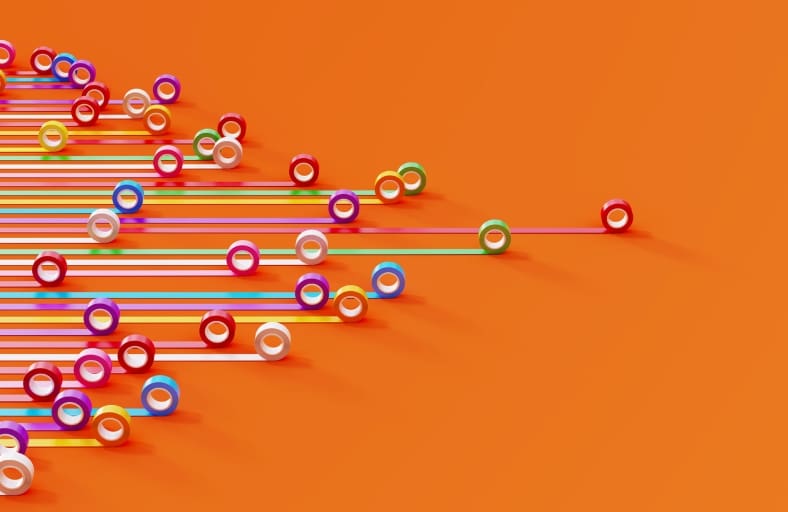
From Support to Strategy: How AI Is Pushing Online Communities to Evolve Into Industry Knowledge Hubs
Online communities have traditionally been seen as the place people go when they hit a wall—a digital help desk for solving problems and moving on. Useful? Absolutely. Memorable? Not so much.
But what if communities could do more? What if they set the tone for industry conversations, influenced customer decisions, and quietly gave your brand a competitive edge?
Thanks to AI, this future is becoming more attainable. With tools that personalize experiences and connect people at scale, communities are evolving beyond support to become strategic hubs.
In a recent episode of “Power of Connection” podcast, Paul Schneider from Higher Logic Vanilla talked with Nicole Saunders, a community leader and expert, about how AI is driving this shift, and what it takes to get there.
How else AI is reshaping online communities? In this episode, Paul and Nicole also dive into how AI reveals hidden intent signals within a community.
How AI Is Shifting Community Engagement
For many communities, the routine is all too familiar: users show up when they’re stuck, search for answers, fix their issue, and leave. “I see it all the time with support communities,” Nicole shared. It’s a cycle of transactional engagement—helpful in the moment but lacking lasting connection.
As Nicole and Paul discussed, AI is starting to change this dynamic. Nicole explained that as knowledge management tools get more advanced, companies need to keep up: “Chatbots have come online, and now we’ve got AI coming in. A lot of tasks support communities traditionally handled are going to start being served more quickly and easily in other ways.”
Evolving Into a Community of Practice with AI
As AI takes over routine problem-solving, it opens the door for communities to become a community of practice—a space where people who are passionate about the same thing, like coding, teaching, or woodworking, come together to exchange tips, tackle challenges, and learn from each other. It’s less about casual conversation and more about improving skills and figuring things out together.
Paul shared how community platforms are evolving to support this shift, highlighting a matchmaking feature Higher Logic Vanilla is working on: “Based on a user’s history, we can identify them as an expert in a particular area. If AI can’t answer a question, it can ping specific members with the expertise to step in.”
This kind of targeted interaction turns what could feel like a sprawling, impersonal forum into a curated space where members feel recognized and valued.
Here are other ways AI is shaping this evolution:
- Delivering smarter suggestions: AI can go beyond offering troubleshooting docs to recommend in-depth discussions or advanced tutorials.
- Encouraging contributions: AI notices when someone’s an expert but quiet and nudges them to share their knowledge—maybe by answering a tricky question or writing a guide.
- Eliminating busywork: AI handles tasks like flagging spam or sorting discussions so the community manager can focus on events or strategy.
- Spotting trends: AI detects patterns, like a rising interest in a new tool, and helps the community manager steer the conversation toward what members care about most.
- Simplifying search: AI tags and organizes posts automatically, so if someone wants advice on, say, using a specific software feature, they can find the best tips fast.
AI helps a community move from just fixing problems to being a place where people grow, share ideas, and work together.
Will AI Diminish the Role of Communities?
It’s the question on everyone’s mind: will AI make communities less relevant? Nicole doesn’t think so. She sees it having the opposite effect. “If anything, it makes communities more important because people are going to crave that human connection,” she explained. “It’s about the qualitative aspect of answers. I don’t want to just know how I’m supposed to do it or how the software works. I want to know how other people have done it. I want to learn about the pitfalls they’ve faced, the tips they’ve found.”
That’s why Nicole believes communities need to lean into becoming communities of practice. What keeps people coming back is the human stories—the context and lived experiences that AI can’t replicate but can help surface.
While communities will always have a role in support and product ideation, Nicole sees their potential as much bigger. “The more you can bring in those other conversations, the more important your community becomes,” she said. By expanding the focus to include broader, more meaningful discussions, communities can become indispensable spaces for connection, learning, and growth.
Bringing Communities to the Center of the Strategy
Perhaps the most exciting takeaway from the conversation was the idea of communities moving to the center of an organization’s strategy. For too long, they’ve been seen as peripheral—a nice-to-have addition to support or customer success efforts. But that’s starting to change.
Paul shared how Higher Logic Vanilla is creating tools to align communities with bigger business goals: “We’re integrating marketing automation so communities can drive customer journeys whether it’s onboarding a new user or nurturing an advocate. It’s automating the process so community managers can focus on strategy, not execution.”
With AI pushing the boundaries of what’s possible, online communities are no longer just support forums. They’re becoming strategic hubs that shape the entire customer experience.
Join the full conversation
For Nicole and Paul’s full take on what AI means for community management, subscribe and catch the complete episode. Plus, Nicole makes the case for merging community and customer marketing, drawing from her experience running both teams.

